- Home
- Rick R. Reed
Orientation
Orientation Read online
Orientation
By Rick R. Reed
Published by JMS Books LLC
Visit jms-books.com for more information.
Copyright 2017 Rick R. Reed
ISBN 9781634863407
Cover Design: Written Ink Designs | written-ink.com
Image(s) used under a Standard Royalty-Free License.
All rights reserved.
WARNING: This book is not transferable. It is for your own personal use. If it is sold, shared, or given away, it is an infringement of the copyright of this work and violators will be prosecuted to the fullest extent of the law.
No portion of this book may be transmitted or reproduced in any form, or by any means, without permission in writing from the publisher, with the exception of brief excerpts used for the purposes of review.
This book is for ADULT AUDIENCES ONLY. It may contain sexually explicit scenes and graphic language which might be considered offensive by some readers. Please store your files where they cannot be accessed by minors.
This is a work of fiction. Names, characters, places, and incidents are solely the product of the author’s imagination and/or are used fictitiously, though reference may be made to actual historical events or existing locations. Any resemblance to actual persons, living or dead, is entirely coincidental.
Published in the United States of America.
NOTE: Previously published by Wilde City Press.
* * * *
For anyone holding out for a second chance.
* * * *
Orientation
By Rick R. Reed
Chapter 1
Chapter 2
Chapter 3
Chapter 4
Chapter 5
Chapter 6
Chapter 7
Chapter 8
Chapter 9
Chapter 10
Chapter 11
Chapter 12
Chapter 13
Chapter 14
Chapter 15
Chapter 16
Chapter 1
It was Christmas, 1983. Robert looked outside the bedroom window. Snow was beginning to fall on Lake Michigan, the gray churning waters eating it up as fast as the sky could make it. Below, the traffic on Lake Shore Drive was spare. No commuters hurried to work this holiday morn. Robert supposed the only people on the road were families on their way to grandma’s house and the unfortunate souls just now returning to their own homes from Christmas Eve revelry. Lake Michigan roiled near the shoreline with huge blocks of ice.
Robert pushed open the sliding glass doors to the balcony, and a blast of frigid air hit him. Earlier, the radio had said something about the day being the coldest on record, with a temperature of twelve below and wind chills much lower than that. But he needed to slip away for just a few minutes, needed to escape the heat set to the mid-eighties inside because his lover, Keith, could not stop shivering, needed to get away from the constant babbling of the TV, tuned to MTV for Keith, and the endless rotation of songs from Michael Jackson’s Thriller.
Most of all, he needed to escape from Keith, who was dying. Robert breathed in and tried not to think about a handsome man, in his prime just a few months ago and now wasting away to a skeletal wraith, and tried to concentrate instead on the crackling in his near-frozen nostrils and how the icy air was traveling to his lungs, invigorating, uncomfortable, and terrifying all at once.
Robert was tired. He had spent the whole week getting their penthouse apartment ready for the holiday, in spite of the fact that Keith was unconscious most of the time and when awake, babbled, moving from non sequitur to non sequitur. It hurt Robert that often he didn’t even know who Robert was. And this from a man, who, just a few months ago, had told Robert he was “the one” and that he had no doubt he would spend the rest of his life with him, a promise that was coming true more quickly than either could have guessed. But Robert soldiered on, determined to infuse their luxurious home with Christmas spirit, denying that that same Christmas spirit was playing hide-and-seek (and winning), and ignoring the fact that his lover was wasting away from a disease they were just getting around to calling AIDS.
Robert had phoned Marshall Field’s, explained that he was housebound with a sick “roommate” and could the store deliver an assortment of lights and decorations, enough to fill a four-bedroom penthouse with merriment. At first, the sales clerk had been hesitant but sympathetic, explaining how the holiday rush would make the kind of deliveries Robert requested impossible. But when she’d heard money was no object, she had been more than happy to comply, even arranging for next-day delivery of designer ornaments and strands upon strands of tiny white lights.
He had talked to the doorman downstairs and convinced him to send up one of the maintenance men to string the lights outside across their balcony and inside on the three Christmas trees he had had delivered from a lot on Belmont Avenue. Robert snorted as he remembered how he had paid more for their delivery than for the trees, themselves. He had made a mix tape of their favorite versions of the holiday classics: Peggy Lee singing “The Christmas Waltz,” Nat King Cole’s “The Christmas Song,” Ella Fitzgerald on “The First Noel,” Les Brown and his Band of Renown doing their version of “The Nutcracker Suite.” He couldn’t bear to let Guy Lombardo’s “Auld Lang Syne” play, though. It made Robert cry.
And Christmas, damn it, was not a time for tears.
He had baked cookies, filling the apartment with the scent of anise from the pizzelles his mother used to make back in Summitville, PA. He had wrapped tons of presents for Keith: sweaters from I Magnin, toys from FAO Schwarz, books and music from Rizzoli.
But Keith had noticed none of it and hadn’t had the energy to open even one present. Robert had unwrapped them for him, holding each up to his lover’s sleeping face, his wheezing, gaspy breaths giving a kind of thanks. At least that’s what Robert told himself. He had even gotten tickets to the big thing in New York, a play called Torch Song Trilogy. He whispered in Keith’s ear that they would go when “he got better” even though Robert knew he never would. But it didn’t stop him from imagining them in a darkened theater, looking over at Keith to gauge his reaction to something happening on stage. Keith could cry at things like Kodak commercials, and Robert imagined him handsome once more, his face lit softly from the stage, with tears rolling down his cheeks. He would return Robert’s gaze, smiling sheepishly, brushing away the tears. Keith’s sensitivity was a big part of what made Robert love him so much.
Nineteen eighty-three had been a hard and wonderful year. Robert had met Keith in a bar called Touché just before New Year’s Eve 1982, and had never expected the one-night stand between the butch leather daddy and the boy fresh from Slippery Rock State College to go any further than that one night.
Robert had liked the grizzled good looks of Keith (thick salt-and-pepper hair, chiseled jawline with a Kirk Douglas cleft, and the body of a Schwarzenegger). He imagined running his fingers through the coarse mat of hair on Keith’s chest and couldn’t look away from how that same chest was so gorgeously framed by his leather vest. Keith had also worn chaps and tight, faded Levi’s.
Robert had on jeans and an Izod shirt, with Adidas running shoes. He was surprised he had even been admitted to the smoky leather bar, notorious for its back room antics, but he supposed his youth, blue eyes, and blond hair had convinced the doorman to ignore the leather dress code. Or maybe—more likely—the doorman chuckled as Robert entered the bar reeking strongly of sweat, cigarettes, and stale beer, because he felt like he was throwing a Christian to the lions.
Robert and Keith had awakened the next morning in each other’s arms in Keith’s penthouse…and Robert had moved in that same week, saying a quick good-bye to his roommate in Rogers Park and throwing a Chiquita banan
a box filled with books and two suitcases into the back of Keith’s Jaguar.
Somehow it had worked, despite the fact that Robert was only twenty-two and Keith double that. Their honeymoon had continued throughout the spring and into the summer. Robert quickly adapted to taking care of the penthouse apartment, even quitting his job as an indexer for Encyclopedia Britannica to make sure the two-story home overlooking Lincoln Park and Lake Michigan was always spotless. He sharpened his culinary skills and took a course in French cooking. Although there was little need for that because Keith’s favorite foods were all decidedly comfort: macaroni and cheese, meatloaf, roasted chicken, soups, and stews. When Robert made his mother’s Sicilian spaghetti sauce with meatballs and pork spare ribs, Keith could never get enough of it, even though Robert told him that Sunday was the day for pasta. They had eaten well and made love through the winter and into Chicago’s damp and dreary spring.
Not right away, but eventually Keith revealed the secret of his wealth and his copious free time: he wrote a series of young adult novels with a teenage witch as its heroine. Adolescent girls would line up when a new edition was delivered to a bookstore, none of them even aware that J.M. Darling was a middle-aged man. He and his publisher had built a fictional life for J.M. and she was a young woman just out of Yale, who had made it big in spite of her orphanage background. The books—and all their translations, different editions, film rights, and more—kept them free from financial worries. Luxuries were never in short supply.
Keith turned the books out easily, which left them a lot of time for play. It was almost as magical as the life of his teenage heroine, Heather Marshall. It was nothing for them to spend long weekends jetting off to Keith’s favorite places: New Orleans, Key West, and Portland here in the States, or even more extravagant trips on the Concorde to Paris.
Then things turned dark. Like a summer storm, the plague crept up on them with low, almost imperceptible rumblings and flashes of dull light. Keith and Robert had driven down to Starved Rock State Park one weekend in June. They had spent the day hiking and eating a picnic lunch on a bluff overlooking the Illinois River. The park rangers wouldn’t have approved of their dessert, but no one was looking.
They figured the hike caused the purple sore that appeared on Keith’s heel the following weekend. He had come out of the shower and held up his foot for Robert to see. At the time, Robert had thought nothing of the sore and had waved it away, wanting to go back to sleep.
“It’s just a blood blister from our hike. I told you your hiking boots were too tight.” He had pulled the pillow over his head.
Then, AIDS had yet to be properly named by the Center for Disease Control. That wouldn’t come until September, wiping out previous monikers like GRID (gay-related immune deficiency) and “gay cancer.” Both men had heard rumblings in the press about gay men getting sick in New York and San Francisco and how one of the symptoms was a kind of rare cancer. Neither of them associated Keith’s “blood blister” with anything serious and certainly nothing deadly.
When Keith woke up several nights in a row drenched in sweat, they attributed it to bad dreams, a touch of the flu. When he languished in bed for two days (an almost unheard of occurrence for Keith) with a temperature of 104, both were finally ready to call the doctor. But the fever broke during the night before Keith’s appointment and he felt fine the next day, so they canceled Keith’s visit to the doctor.
“Like a million bucks,” he said, smiling at Robert over the breakfast table and using one of his favorite expressions. Robert thought his lover’s wan face and ashen color was due to the fever and that it too would pass.
But it didn’t.
By September, Keith had many more of the purple sores. After a while, they knew they were living in denial and Keith needed to see a doctor. The talk of “gay cancer” and mysterious, quick, and unpleasant deaths continued to grow in the media, but neither of them was ready to accept that was happening to Keith. They knew seeing their doctor, a handsome friend of Keith’s, would confirm anemia or something equally harmless and treatable. Looking back, though, Robert wondered if they both knew, deep down, they were kidding themselves.
It wasn’t so much the doctor who confirmed their horror and entrenched them in it, but the subsequent tests and the continued blossoming of purple sores. Doctor McKean, whose practice consisted mostly of younger gay men, had seen the sores too many times not to know what they were. He told Keith and Robert what they already feared: the sores were not blood blisters, but Kaposi’s sarcoma lesions.
It seemed that once they were named, the lesions spread even more rapidly over Keith. When the first one appeared on his face, he refused to leave the apartment.
Things went downhill fast. Repeated bouts with pneumocystis carinii pneumonia (PCP) weakened Keith’s rapidly flagging immune system. He started to have trouble walking and seeing, and finally, went blind. And then the disease began to eat away at his mind.
Here on the balcony, Robert pushed hard at his eyes and tried to stop remembering, forcing himself back into the present, this “holly, jolly Christmas, the best time of the year.” He tried to rein in the shivers the subzero air and whipping wind were causing. Gazing out at the water again, Robert wondered how fast he would die if he threw himself from some of the boulders down there. How long did hypothermia take anyway? Gripping the railing of the balcony, he supposed a twenty-three story drop would be a much quicker—and more efficient—way to die. But throwing oneself from boulders into a churning mass of gray water and slushy ice seemed so much more dramatic, so much more Dark Victory. And besides, hypothermia, with water as cold as the lake surely was at this time of year, might be equally quick, shutting down his body’s vitality in minutes, perhaps only seconds.
These were questions he would leave to ponder. But now, there was a lot of Christmas left and he was freezing. He went back inside. Maybe there would be a Christmas miracle and Keith would be sitting up in the bed, a twinkle in his eyes, with a few lucid words for Robert. Maybe he would have gotten out of bed and dragged a hidden cache of presents out from the closet, all for Robert. Maybe he would confess that his fever had broken and he was once again feeling “like a million bucks.”
Maybe not.
He slammed out the cold with a slide of the glass door and breathed in. Keith’s sheets would probably need changing.
* * * *
Christmas night was memorable for Robert, if only because it was the night the one great love of his young life was taken, stolen away by a disease he could never have imagined just a few years before. The night was also memorable because there was a kind of Christmas miracle, even if it lasted only a few moments. Keith came back to him. His Keith, the one who could make him laugh and make him feel “like a million bucks.” For the briefest of moments, the real Keith returned, smiling and making of his death mask face a hint of what had been there before: a handsome, distinguished man whose cheeks were no longer sunken and hollow, whose green irises were rimmed in yellow no more, and whose smile could light up a room.
Maybe seeing the old Keith, handsome, devilish, strong jawed from his Mediterranean heritage, was just a figment of Robert’s imagination, something he wished for so hard it came true. But the lucidity that came late that Christmas night was not his imagination. Something had clicked in Keith’s fevered brain and for just an instant, he came back.
But it was only to say good-bye.
Robert had spent the long afternoon cooking. He knew it was pointless. Keith, in his best moments, could only keep things like Jell-o and protein drinks down, and Robert had no appetite himself. But in spite of a decided lack of hunger around the Harris/Jafari household, Robert had made quite a testament to culinary expertise in the marble and glass kitchen. The counters were crammed with cutting boards where Robert had used his Wusthof cutlery to prep a garden of fresh herbs, mincing parsley, sage, basil, and thyme into stacks of fine green confetti. He cut garlic into translucent slices. Halved lemons lined up in an
orderly row beneath the windowsill, waiting to release their juices. And there, near the sink, a twelve-pound goose was ready to have its skin loosened and lifted and for him to infuse it with chopped herbs, to stuff its cavity with lemons and whole garlic cloves, and, finally, to be buttered and rubbed lovingly with extra-virgin olive oil and trussed. It would spend the rest of the day basking in the heat of an oven, religiously basted every forty minutes. Robert had made oyster stuffing, rich with fresh-from-the-sea briny juices, sage, and fennel sausage. He had shorn the bottoms off artichokes, trimmed their leaves, and stuffed them with a mixture of bread crumbs, garlic, and Parmigiano-Reggiano cheese. In the sink, a mound of Yukon gold potatoes awaited peeling. Brussels sprouts needed to be cleaned, steamed, and tossed in butter, lemon juice, and garlic.
And when the kitchen windows fogged with steam from bubbling pots and the whole first floor of the penthouse was redolent with roasting bird, Robert went into the little powder room off the kitchen and threw up. He sat there by the toilet afterward, gasping and wiping angrily at his mouth and nose with Kleenex that left shreds on his stubbled face. He started to sob, the tears coming easily, hating himself for being such a coward, for spending all this time, all this money, to prepare this glorious yuletide feast no one would ever eat. He slapped his own face, punishing himself for being so stupid, stupid, stupid. Who was he trying to kid? Did making a Christmas goose with all the trimmings wipe out a year of love, passion, and happiness? Did all the cooking, decorating, and wrapping of presents put a different face on Death, who paced the penthouse, features furrowed, waiting to take his own Christmas present, which lay, just inches away from “delivery” on sweat-soaked Egyptian cotton sheets?
Why couldn’t he accept what was happening? It was over. It was only a flame that had flared and then was snuffed out. He forced himself up, gripping the little pedestal sink, and splashed cold water on his face. He looked at himself in the mirror above the sink, hating the vibrant, rosy glow in his cheeks, his fine, small-pored skin, twinkling blue eyes that betrayed not a hint of his exhaustion and despair, and his shining blond hair, in ringlets because of the kitchen humidity.

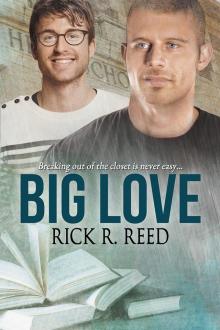 Big Love
Big Love Blue Umbrella Sky
Blue Umbrella Sky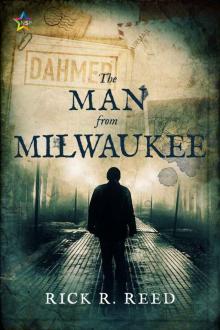 The Man From Milwaukee
The Man From Milwaukee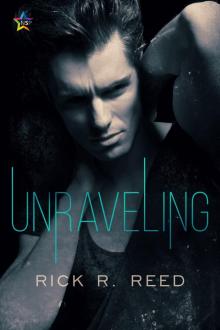 Unraveling
Unraveling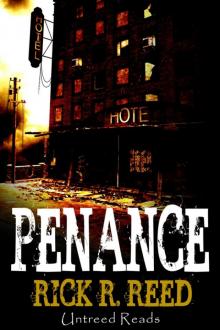 Penance
Penance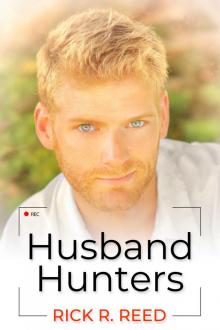 Husband Hunters
Husband Hunters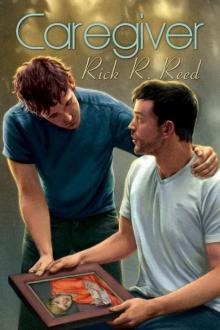 Caregiver
Caregiver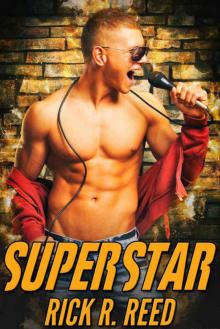 Superstar
Superstar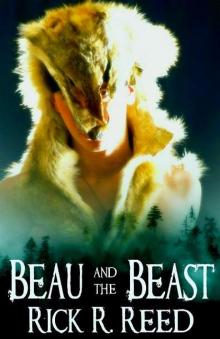 Beau and the Beast
Beau and the Beast Obsessed
Obsessed Bigger Love
Bigger Love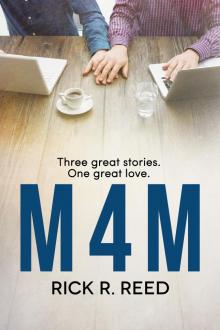 M4M
M4M I Heart Boston Terriers
I Heart Boston Terriers Dinner at Jack's
Dinner at Jack's A Dangerous Game
A Dangerous Game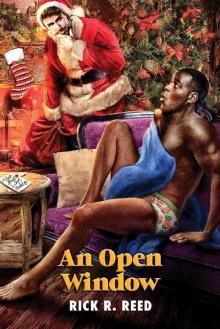 An Open Window
An Open Window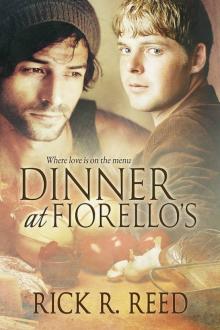 Dinner at Fiorello’s
Dinner at Fiorello’s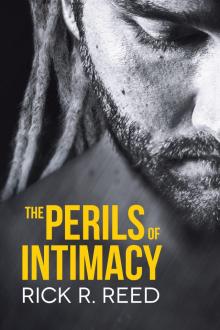 The Perils of Intimacy
The Perils of Intimacy Orientation
Orientation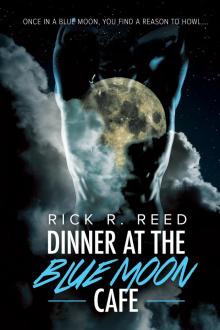 Dinner at the Blue Moon Cafe
Dinner at the Blue Moon Cafe High Risk
High Risk Sky Full of Mysteries
Sky Full of Mysteries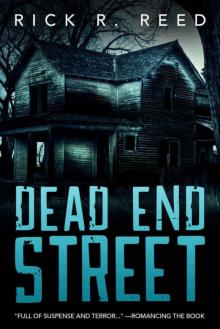 Dead End Street
Dead End Street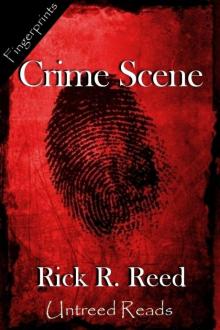 Crime Scene
Crime Scene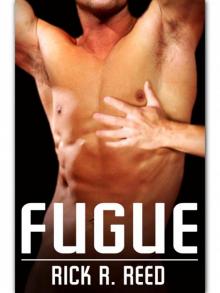 Fugue
Fugue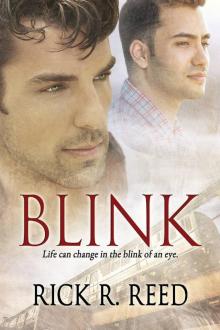 Blink
Blink Lost and Found
Lost and Found